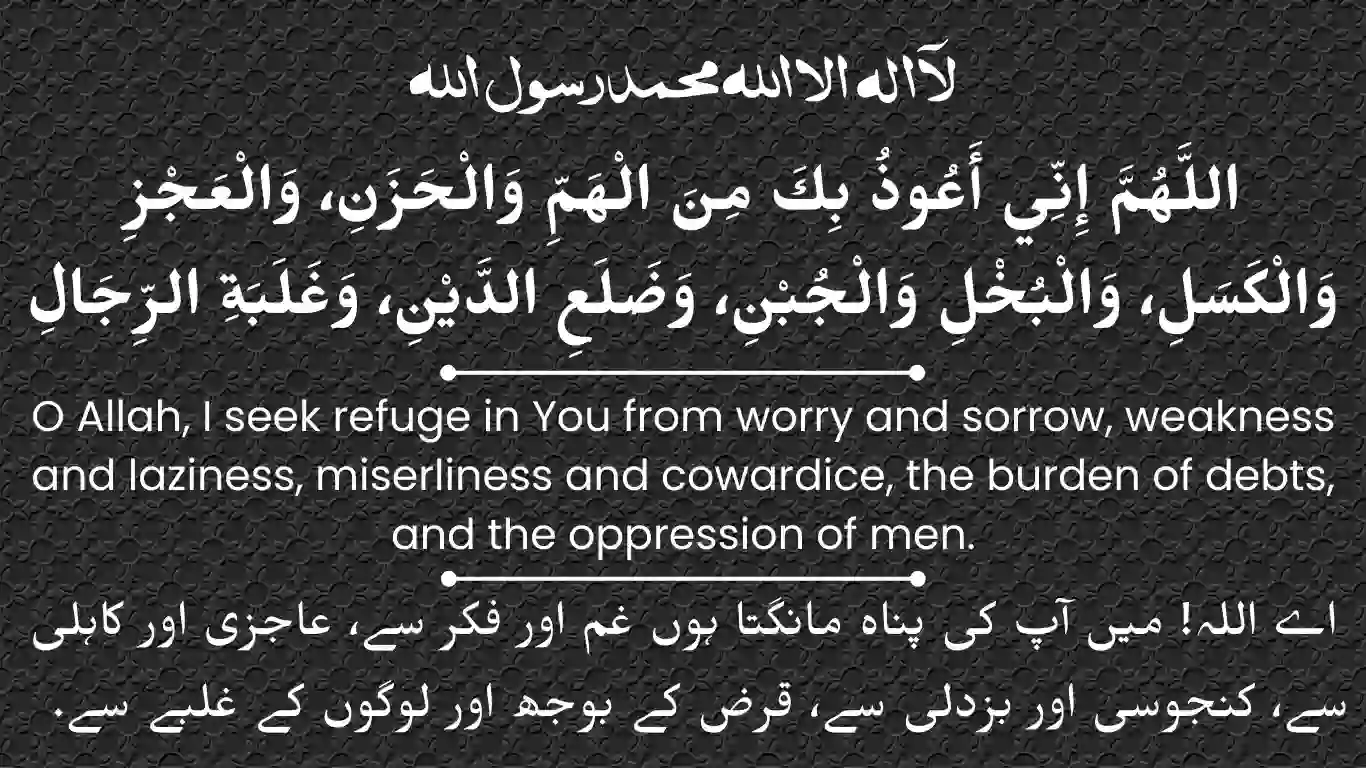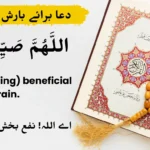The beautiful and profound dua, Allahumma Inni Auzubika Minal Hammi Wal Hazan Dua, is a powerful prayer recited by Muslims worldwide. This dua is a heartfelt plea to Allah (SWT) to seek refuge from worries, sadness, and other hardships that burden the soul. In this article, we will delve deeply into the meaning, significance, and benefits of this dua, providing a thorough explanation of each part with translations in Arabic, English, and Urdu.
| What is Salatul Hajat Dua The Prayer of Need? |
| What is Kalma e Tauheed? | (لا إله إلا الله) |
| 1st Kalma Translation- There is no deity but Allah |
| Namaz E Tahajjud Ki Dua | Mid Night Prayer |
Full Arabic Text of the Dua
اللَّهُمَّ إِنِّي أَعُوذُ بِكَ مِنَ الْهَمِّ وَالْحَزَنِ، وَالْعَجْزِ وَالْكَسَلِ، وَالْبُخْلِ وَالْجُبْنِ، وَضَلَعِ الدَّيْنِ، وَغَلَبَةِ الرِّجَالِ
English Translation
“O Allah, I seek refuge in You from worry and sorrow, weakness and laziness, miserliness and cowardice, the burden of debts, and the oppression of men.”
Urdu Translation
اے اللہ! میں آپ کی پناہ مانگتا ہوں غم اور فکر سے، عاجزی اور کاہلی سے، کنجوسی اور بزدلی سے، قرض کے بوجھ اور لوگوں کے غلبے سے۔
Breaking Down the Dua
1. Allahumma Inni Auzubika Minal Hammi Wal Hazan Dua (اللَّهُمَّ إِنِّي أَعُوذُ بِكَ مِنَ الْهَمِّ وَالْحَزَنِ)
- Translation: “O Allah, I seek refuge in You from worry and sorrow.”
- Explanation: This part seeks Allah’s help against emotional distress and sadness. It reminds us to place our trust in Allah when overwhelmed by life’s challenges.
2. Wal Ajzi Wal Kasal (وَالْعَجْزِ وَالْكَسَلِ)
- Translation: “From weakness and laziness.”
- Explanation: Here, we ask Allah to grant us strength and protect us from feelings of inadequacy and procrastination that hinder personal and spiritual growth.
3. Wal Bukhl Wal Jubn (وَالْبُخْلِ وَالْجُبْنِ)
- Translation: “From miserliness and cowardice.”
- Explanation: Miserliness prevents us from helping others, and cowardice keeps us from standing up for what is right. This phrase encourages generosity and bravery.
4. Wa Dala’id-Dain (وَضَلَعِ الدَّيْنِ)
- Translation: “From the burden of debts.”
- Explanation: Debt can weigh heavily on a person’s heart and mind. This plea asks for protection from such financial pressures.
5. Wa Ghalabatir-Rijal (وَغَلَبَةِ الرِّجَالِ)
- Translation: “And the oppression of men.”
- Explanation: This part seeks refuge from being overpowered or wronged by others, ensuring peace and justice in life.
Benefits of Reciting This Dua
- Spiritual Peace: Recitation brings a sense of relief from stress and sadness.
- Mental Clarity: It fosters courage and determination, helping overcome procrastination and fear.
- Protection from Financial Strain: Seeking protection from debt reduces anxiety about monetary issues.
- Strength Against Oppression: It provides inner strength to face challenges from others.
How and When to Recite This Dua
This dua can be recited:
- After Salah (Prayer): Incorporate it into your daily prayers.
- During Difficult Times: Whenever faced with stress, sadness, or challenges.
- Morning and Evening: To begin and end your day with Allah’s guidance and protection.
FAQs
This dua is a supplication seeking Allah’s help against emotional, mental, and financial burdens while asking for strength and protection in life.
Yes, this dua can be recited anytime but is particularly beneficial after prayers or during moments of distress.
Seeking refuge from laziness helps in achieving productivity, discipline, and success in both worldly and spiritual matters
Conclusion
The dua “Allahumma Inni Auzubika Minal Hammi Wal Hazan Dua” is a profound and comprehensive prayer that covers various aspects of human struggles. Its recitation serves as a reminder of Allah’s mercy and the strength we derive from His guidance. By incorporating this dua into your daily routine, you can achieve inner peace, resilience, and a sense of empowerment to tackle life’s challenges. May Allah accept our prayers and grant us ease.





After looking into a handful of the blog articles on your website,
I seriously like your technique of blogging.
I added it to my bookmark site list and will be checking back
soon. Take a look at my web site as well and tell me your opinion.